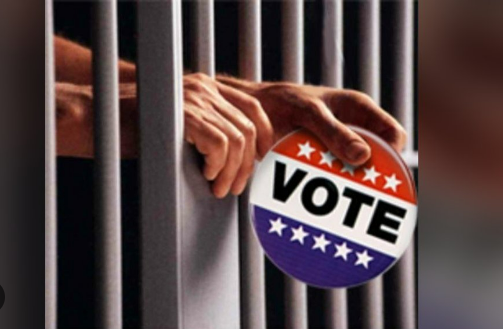Massachusetts Lawmakers Seek to End Felony Disenfranchisement
Changes would allow voter participation regardless of incarceration status

In every Massachusetts election, nearly 9,000 incarcerated eligible voters (people incarcerated pretrial, for misdemeanors or civilly committed), mostly Black and Latino, are purposefully kept uninformed of their right to vote, and in some cases, illegally denied absentee ballots or find out these ballots get rejected. Massachusetts has no system in place across its 14 counties to ensure incarcerated voters have equal, or any, access to casting ballots.
These eligible voters think they have lost their right to vote, often because they’ve been told as much by corrections officers. For so long, this system failure has fostered a culture of disenfranchisement that extends beyond the wall and when returning to their communities after completing sentences, as incarcerated citizens are released from prison or jail with the belief or fear that they have permanently lost the right to vote.
Currently, Massachusetts revokes the right to vote from individuals convicted of felonies for the duration of their incarceration. For the current legislative session, lawmakers have introduced several proposals to end felony disenfranchisement through a state constitutional amendment. Massachusetts state senators Liz Miranda (D) and Adam Gomez (D) filed both a bill to alter the current voting status of persons incarcerated due to a felony charge and a legislative amendment to the state constitution to make the relevant changes. Parallel proposals were introduced by Massachusetts state representatives Erika Uyterhoeven (D), Chynah Tyler (D) and Mindy Domb (D) in the state House.
Civic engagement is fundamentally good for people and communities on both sides of the wall. As the Sentencing Project states in a 2022 report “voting appears to be part of a package of pro-social behavior that is linked to desistance from crime.” Increasing civic participation reduces recidivism; one study found that among individuals who had been arrested previously, 27% of non-voters were rearrested, compared with 12% of voters.
Jeremiah Mungo, an organizer with More Than Our Crimes, said "The disenfranchisement of incarcerated people is one of the biggest obstacles to criminal justice reform that our country faces. When an individual is behind bars, they are effectively voiceless. They do not have the ability to change the system that has harmed them. But by giving people behind the wall an opportunity to cast their ballot, we can give them their voice back. We can give them a say in the system that has led to their own imprisonment."
You can learn more about More Than Our Crimes, their mission and advocacy by visiting their website.










